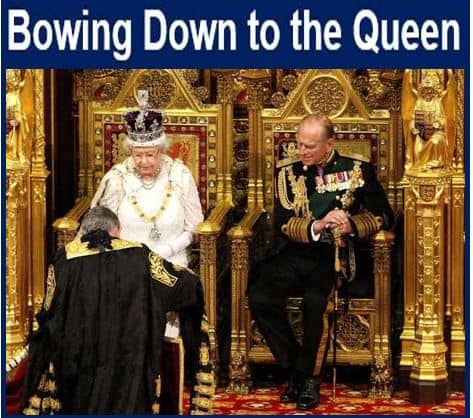Jeremy Corbyn, Labour’s new leader, said he could not attend a ceremony to join the Privy Council because of a ‘prior commitment’. This commitment turned out to be a hiking outing with friends in the Scottish Highlands, according to the Sunday Times.
Corbyn’s aides are now saying their leader needed some ‘relaxation time’. One wonders if one day, as leader of the country (Prime Minister), he would opt for ‘relaxation time’ in moments of national emergency when the human body and mind may tire very quickly.
What is the Privy Council?
The Privy Council, known formerly as Her Majesty’s Most Honourable Privy Council, is a formal body of advisers to the United Kingdom’s monarch. Its members are mainly senior politicians – either current or former members of the House of Commons or House of Lords.
 Bowing Down: Jack Straw, the Lord Chancellor, a lifelong Labour politician. This is what Mr. Corbyn does not want to do.
Bowing Down: Jack Straw, the Lord Chancellor, a lifelong Labour politician. This is what Mr. Corbyn does not want to do.
The Privy Council advises the monarch on the exercise of the Royal Prerogative, and issues executive instruments known as Orders in Council, which enact Acts of Parliament among other powers.
The Privy Council was established by Queen Elizabeth I (1533-1603) to help her deal with other nations, work with the army, and take care of other important issues. Since then, much of its responsibilities have been taken over by the Prime Minister’s Cabinet.
Members must take an oath
When somebody becomes a Privy Council member, he or she must take an oath to protect state secrets. The oath is carried out in a ceremony which involves bowing down to the monarch and kissing his or her hand.
Mr. Corbyn is a republican, i.e. he would like to see kings and queens done away with in the UK, and replaced by, for example, a President.
Most of the British press believes Mr. Corbyn dodged the Privy Council ceremony because he did not want to bow down to the queen and/or kiss her hand.
However, until he takes the oath, he and his party (the formal opposition) will not have access to sensitive information, often about national security.
The criticism against him is not that he snubbed the Queen, but the way he explained it – initially that he had a prior engagement, which a newspaper later finds out was a hiking outing in the Scottish Highlands with friends.
He should have said he did not want to kiss the Queen’s hand or bow in front of her. If he is to be taken seriously as Leader of the Opposition and a potential Prime Minister, he needs to be open with British citizens (voters) about his engagements and priorities. Hiding facts or distributing unclear, wishy-washy press releases about his whereabouts is not the required behavior of a democratic leader.
Video – Jeremy Corbyn in BBC interview
In this wide-ranging BBC interview, Mr. Corbyn says he will not campaign for the UK to leave the EU. He also talks about leadership and the Queen.
